Do you know what happens when newbies get into prepping and survival? They buy stuff. And it’s usually gear they regret getting 6 months later when they know better.
Little do they know there’s an entire list of things they can do to increase their chances of survival, things that are 100% free.
We already have an article on all the ways to save money prepping. Today we’re taking things even further by focusing on those preps that won’t cost you a single penny. Trust me, you’re going to love this list. 🙂
#1. Work Out
No, I’m not talking about paying for expensive gym memberships, equipment, and supplements. You don’t need that. In fact, gym workouts are entirely focused on strength and looking good in the mirror.
I’m talking about survival fitness. What we need as preppers is to also improve our flexibility and stamina and you can do that at home or by walking around town.
As long as you have a pair of running shoes, you’re good to go. Walking, jogging, body-weight exercises, hiking, these exercises don’t cost a thing.
Climbing that hill in your backyard or running the bleachers at the local high school football field is free and will help build your stamina.
#2. Forage
Whether you live in a rural, suburban, or urban area, there’s one thing you can do in all of these areas: foraging.
As long as you’re not trespassing and know which plants and berries, you have a wide variety of wild edibles for your next salad, things like blueberries, blackberries, chicory, goldenrod and dozens more.
#3. Create a Home Inventory List
Pretty much all of the things we take for granted today will be gone post-collapse.
I’m willing to bet there are a lot of items hiding inside your attic, your garage, your basement, and your closets, that you see as garbage right now, but can prove to be extremely useful post-collapse.
You don’t have to make a list per se, but you do have to take every item one by one and ask yourself:
How would I use this post collapse?
it might take a while to figure it out, but in most cases, you’ll know right away if something that isn’t useful now will still have still has value.
If you can’t think of anything, just google “alternative uses for X” or “survival uses for X” and you might be surprised at of all the uses you’ll find.
Old clothes, old boxes, old backpacks, tools – all of these can be re-purposed during a SHTF situation. Even your old comic books will provide some comfort in a world with not cable and no Internet.
#4. Bartering
Who says bartering is something you will only use post-collapse? You can use bartering today to trade some of the stuff you don’t need for other stuff that you do. No taxes to be paid, no hassle, AND you get to practice a crucial survival skill.
Get in touch with fellow preppers and see if they have things you might need, or if they need things you have. Oftentimes, when buying in bulk, we end up having too much of one thing. Why not trade your excess for someone else’s excess so you both win?
Also, check your home inventory list (the one you just made). Just because you don’t find value in some of the stuff you found, that doesn’t mean someone else won’t. Don’t limit yourself to talking only to preppers, some people like collecting old stuff as a hobby.
#5. Make Your Emergency Plan
Figure out the disasters most likely to hit you area. Decide what you’ll do in a variety of bug in and bug out scenarios. Get your family on board with this. We have several articles covering survival plans from different angles, namely:
#6. Do Drills
Now that you have your scenarios in place and everyone knows what to do, how about a little practice?
Common scenarios include bugging out, giving first aid, bugging in, fire drills, and getting quickly to your safe room, and home invasions. If you can get your family on board to practice, that’s even better.
#7. Learn a Foreign Language
Knowing a second language may help you communicate better in who knows what odd situations you’ll end up in.
#8. Scan Your Prepping Plans for Holes
If you’ve been doing this for a while, it’s time to step back and play devil’s advocate for a little bit. See your house, your bug out location, and your preps from the bad guy’s perspective.
What would I do if I were a burglar? What if I were a rioter? Or a nosy neighbor?
There’s no such thing as a prepping plan without holes.
If you periodically check your planning for what’s missing, you can gradually increase your readiness for disaster.
#9. Get Stuff for Free Using Coupons
If you’re looking to turn yourself into a coupon king or queen, you can learn it how to get stuff for free.
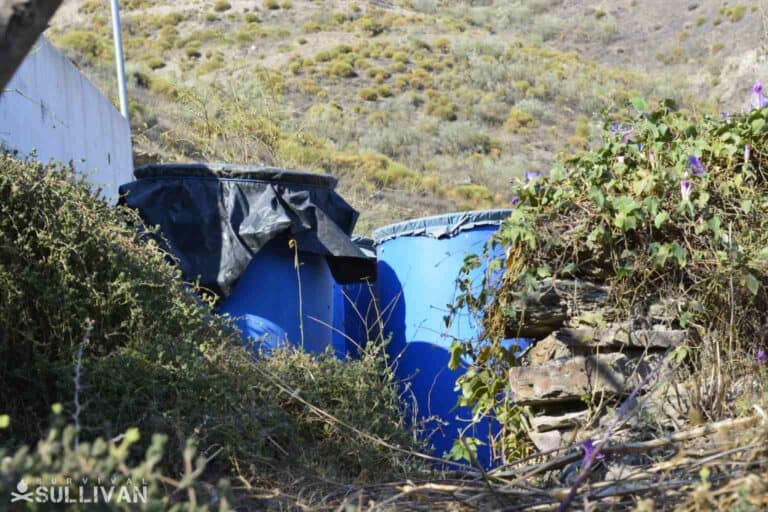
#10. Harvest Rainwater
Rainwater harvesting may or may not be legal where you live, but you don’t need an an entire system just yet. If you have a few barrels, you can just place where the pipes and and use water to water your garden or plants, do the dishes, flush the toilet, wash your dog, etc.
#11. Get Free Stuff From Fast Food Restaurants
This may or may not be your cup of tea but, as you know, a lot of fast food restaurants offer free plastic forks, knives, spoons, chopstick, napkins, wet wipes, and small packets of salt and pepper.
These all come in wrappers, of course, ready to be stockpiled.
#12. Reorganize Your Preps
If you’re looking to stockpile even more stuff, you’re probably gonna need more space.
Reorganizing everything is free and keep in mind that you can store a lot of things in places like the garage, closets, unused cupboard space, your basement, or shed.
Careful about rodents, though. They’re able to chew their way through plastic, so you should use metal buckets or, maybe just hang some of your preps with Paracord.
#13. Hiding a Cache In Your Back Yard
It’s free, though you’ll need a proper container, such as a PVC pipe and cap or airtight plastic, or glass jar to store your preps. Plus, digging the hole will give you quite the full body work-out. And all you need is a shovel.
There’re a few details to keep in mind when burying a survival cache which we’ve outlined here.
#14. Designate and Prepare Your Safe Room
You should at least move some of your preps inside and try to reinforce the door by yourself. After that you’ll need to start assembling your survival kit.
Since we want to do this for free, what you can do is scout your house or barn for survival items you have in excess (e.g. candles) and move those to your safe room survival kit. Read our detailed article on how to set up a safe room.
#15. Label Your Preps
If you’re thinking about expanding your preps, you’re going to want to know what’s in each container. This is something you do when you actually seal the containers, but it’s never too late (as long as you know what’s inside without opening it).
#16. Bug Out Route Planning
It’s good to know all possible routes out of your town or city because you never know which ones you’re going to take in a bug out situation.
Even if you live in a rural areas, you should still have routes planned out, because in the heat of the moment, your mind could freeze and you could forget a crucial turn.
Having everything clearly marked on your maps could save you precious seconds when you’re on the run. Don’t forget to laminate your maps, or to at least place them in zipper bags so they don’t get wet.
#17. Train Your Dog
Some preppers have bug out bags for their dogs and that’s very thoughtful, but how will you control your dog when chaos breaks loose? If it’s not listening to you now, it sure as heck won’t listen when SHTF.
#18. Become a Gray Man
Blending into the crowd or a post-apocalyptic society isn’t something you have to wait until SHTF to practice. I wrote no less than 50 ways to do it here. Being “average” when you’re anything but, is an art. I suggest you start practicing today.
#19. Sign Up For Free Classes
Online, offline, webinars, it doesn’t matter. As long as you can interact and ask questions on survival, homesteading, firearms, and self-reliance, you should probably join.
#20. Work On Your Skills
Buying survival items costs money but practicing and using them is free. As long as you already have them, it’s time to improve your skills. Start with the most basic ones, and be sure to stick to each of them until you become passable.
You’re going to enjoy some more than others, and that’s great; just make sure you don’t ignore the ones you don’t like, because all of them may be important.
#21. Read!
Reading is free and there’s enough survival information on the web to keep you busy for years. Heck, this site alone has almost 2,000 published articles – and they are all free!
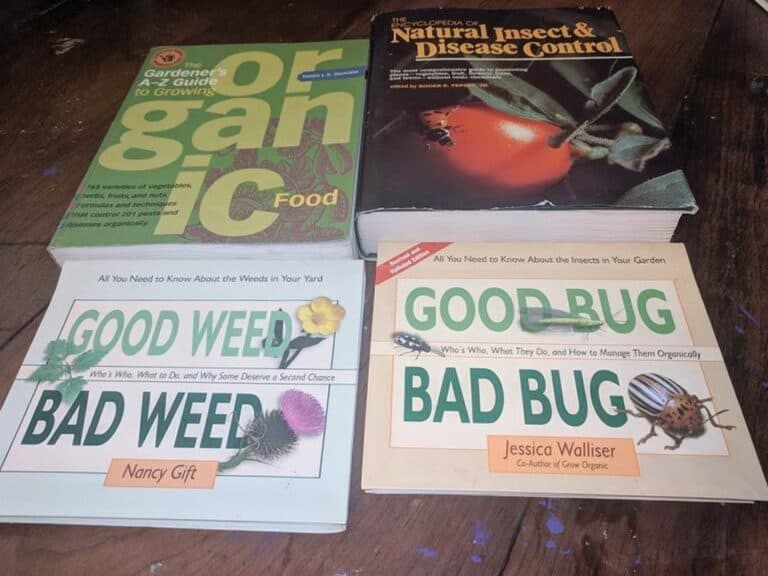
The more you read, the better you can judge for yourself which info is good and which isn’t, so you can make better prepping decisions.
Be careful though – reading leads to procrastination, and you don’t want that.
#22. Convince Others to Start Prepping or to Become Self-Reliant
Talking is free, right? It’s a lot easier when you’re not alone. If you’re afraid people will think you’re crazy for wanting to prep, how about convincing them to do things that will indirectly help you prepare, such as foraging, camping, hiking, or simply going to the gym to improve your fitness levels?
#23. Ask Neighbors for Excess Produce
If you haven’t been able to start your own garden yet, you can ask neighbors for their excess produce including fruit.
If they seem reluctant to share, you can offer to do some weeding in the garden or other chores in exchange for their excess fruit and vegetables.
It will cost you a little bit of time and effort, but you’ll get fruits and veggies that you can freeze or home can for free.
#24. Use Your Skills to Pay for Something You Need
Just like you can barter items, you can also use your skills, the things you do know how to do, to “pay” for things that you want or need for your prepping stockpile.
Do you know your way around cars? Are you good with carpentry or good with numbers?
Offer to repair a neighbor’s car, build a ramp for their elderly mother, or do the taxes or bookkeeping for that small business that just opened in your town.
You can either use the money you earn to buy preps or you can trade the work you do for something they have for sale that you need for your preps.
#25. Ride Your Bike
Not only will riding your bike on a regular basis help you stay physically fit and build your stamina, but you can practice taking your alternate bug out routes and finding new ones.
Figure out how your bike performs on wet pavement, in fine gravel, or when you head off road to cross a field. Take note on which types of terrain or weather conditions could be problematic for your bike.
Then, when your budget allows, upgrade your tires or change the tread type so that your bike will perform better on a variety of surfaces.
#26. Create a Neighborhood Watch Group
Although you do have to exercise some caution when talking about your prepping plans, most experts will agree that neighborhood watch groups can be beneficial.
Not only can you get to know your neighbors and work together to keep your entire neighborhood safer now, you can get an idea of which neighbors might be good to approach about a MAG (mutual assistance group) when SHTF. One tool I found for this is nextdoor.com.
It’s nationwide and has some safety features built in that helps to keep creeps and pushy salespeople from infiltrating the group. Go to the site, verify the neighborhood you live in, and the site will automatically add you to the closest neighborhood.
If there isn’t a group for your neighborhood, you can start one like I did. Through the site you can send out free postcards to neighbors, telling them about the watch group and inviting them to go online and join.
#27. Stockpile empty pill bottles and other containers
If your budget is tight right now, you can get a head start on prepping by saving empty plastic pill bottles and other plastic containers which you can use to organize and waterproof your supplies as you buy them.
You can use those metal and plastic containers, such as Altoids tins, plastic tupperware containers from store bought deli meat, even plastic take out containers, to create mini kits.
Stockpile the containers now, then when your budget allows, make a mini first aid kit, a fishing kit, sewing kit, fire starting kit, or even to create a mini entertainment kit with dice, paper, pencil, etc.
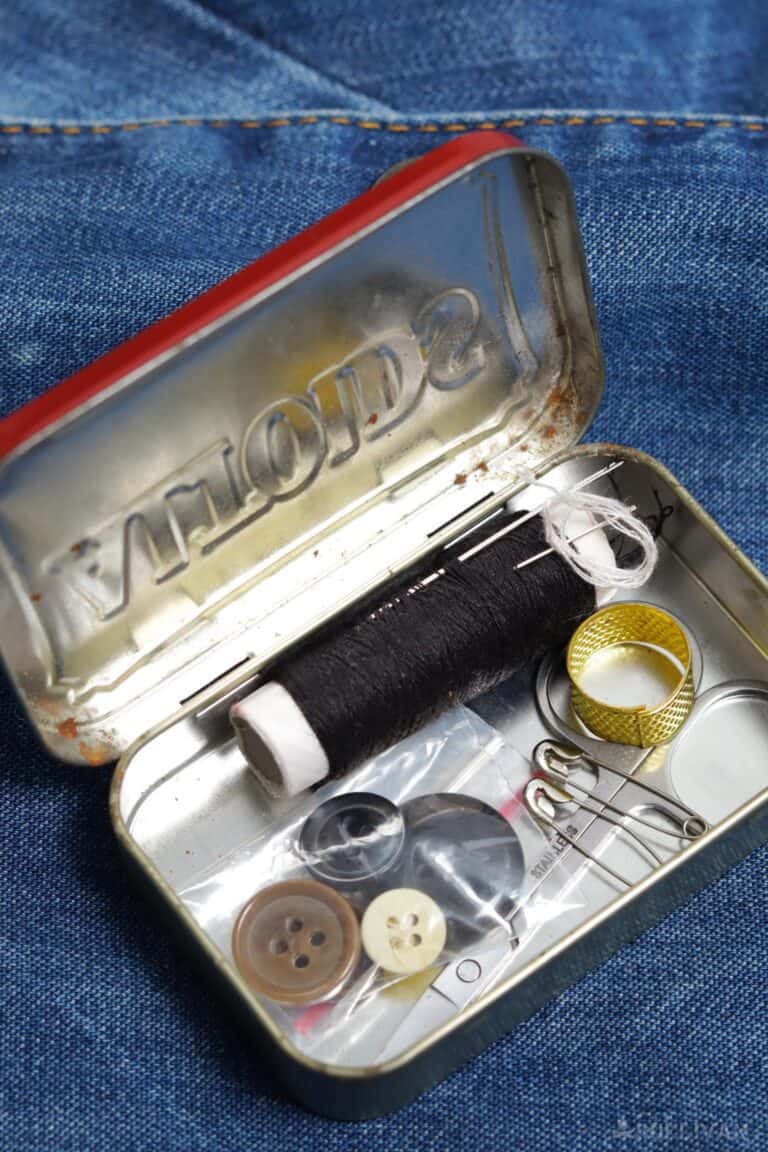
#28. Save Plastic Jugs and Juice Containers
One thing you can do to prep that is 100% free is to save any plastic jugs or juice containers as you empty them. Be sure to wash them out thoroughly and let them dry completely.
As long as these containers are thoroughly cleaned and dry, you can use them to store all kinds of things including pasta, grains, dried beans, etc.
#29. Stockpile Water
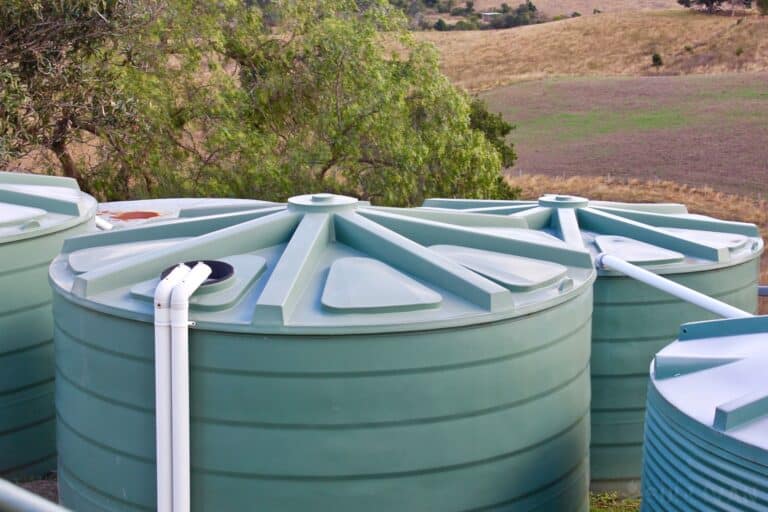
If you have a freshwater pond or stream that is accessible to you, start stockpiling water and it won’t cost you anything.
The water you collect and store can be used as is for a variety of survival tasks such as watering the garden, flushing the toilet, watering animals, or washing clothes. You can even filter and purify the water for drinking and cooking if needed.
#30. Learn to Do Minor Car Repairs
Another thing you can do that is 100% free is to learn how to do minor car repairs for your vehicles. Technology has advanced to the point where the Internet and YouTube are a huge resource.
There’s no reason you can’t spend time now to at least learn to change the oil, check the fluids, and change fuses, tires, or headlights on your car. When your budget allows, get parts and do the repairs.
And a bonus of learning how to do minor car repairs and maintenance yourself, is that you can use the money you would have spent on repairs to buy some preps.
#31. Save empty cans and reuse them for DIY projects
There are a ton of DIY prepping projects you can learn how to do from watching YouTube videos. Many of them can be done using empty tuna cans, soup cans, coffee cans, or #10 cans.
If you save these cans after you use them and wash them out, you can make things such as a hobo stove, candles, or even an oven.
#32. Get Free Information to Your Phone
Disclosure: This post has links to 3rd party websites, so I may get a commission if you buy through those links. Survival Sullivan is a participant in the Amazon Services LLC Associates Program. As an Amazon Associate, I earn from qualifying purchases. See my full disclosure for more.
One of the really helpful things you can do to prep that is 100% free is to get free kindle books from Amazon.
Simply search “free books on wild edibles, free books on survival, etc. and then scroll through the list for the ones you want.
You can also find many different free mobile apps that provide excellent information such as Scanner Radio for Android. There are others, you simply need to look for them and download them.
Read about all of the ways to load your phone with survival info here.
#33. Learn Knot Tying
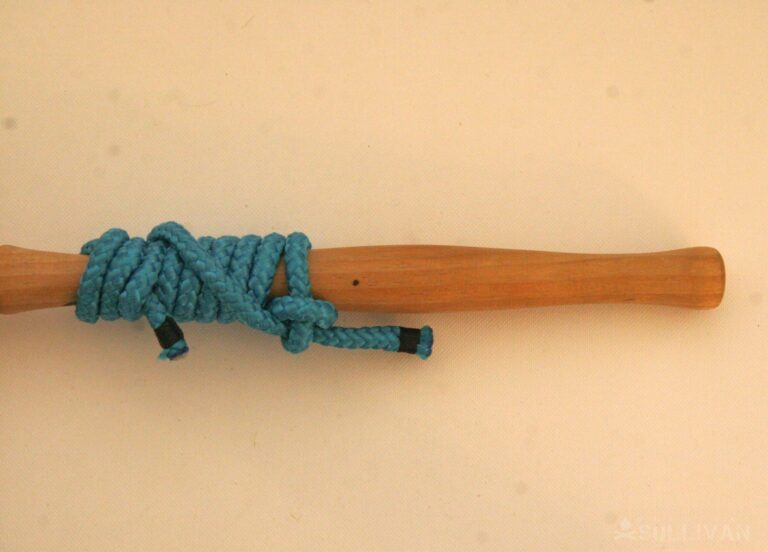
There are so many different types of knots and so many reasons that you would need to use them in a survival situation. Learning and practicing knot tying is 100% free, and it’s a vital skill that might one day save your life.
If you don’t have Internet service or a computer, head to your public library. Most libraries have internet connected computers that can be used for short periods of time.
#34. DIY Your Own Portable Toilet
You can use an empty 5-gallon bucket to make your own portable toilet to use for emergencies or in your safe room. If you don’t have a bucket, check with local businesses, such as restaurants or bakeries, to see if they are giving any away for free.
To make the seat for your portable toilet, cut a hole in the lid that comes with it or slice a pool noodle along the center and fit it around the top of the open bucket. Make sure you know how to dispose of the waste materials safely.
#35. Shelter Building from Natural or Found Materials
Just like you can learn knot tying from watching YouTube, you can also learn how to build a shelter from natural or found materials. Learning this skill is free and since you are using materials that you find; you can practice making the shelters without so much as a ding in your budget.
#36. Practice Fire Starting
One of the most vital skills you need to have in a survival situation or when SHTF is the ability to start a fire.
Most people can start a fire in normal conditions, using a lighter or matches. But what if your life depended on you starting a fire without matches or a lighter?
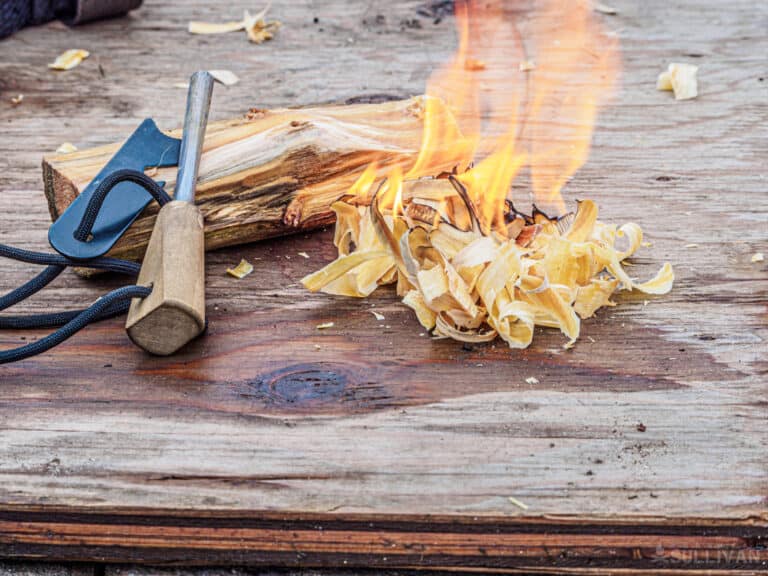
What if you had to start a fire in rainy, wet conditions and you only had two matches left? Are you confident that you could get that fire started?
Practice now so that you can be confident in your fire-starting ability. Practice is free and you’ll be glad you invested the time.
37. Collect Condiment Packages
If you’ve ever been out to a restaurant, gotten takeout food, or gone through the drive-through at a fast food place, you know they give out packets of condiments.
Ketchup, mustard, jelly, salad dressings, sugar, salt, pepper, and more will all come in handy in a pinch.
Instead of throwing these away or passing them up, start collecting them. Condiments will be vital in a survival or SHTF situation to help you make your meals appetizing.
#38. Join Upcycle or Pay it Forward Groups to Get Free Items
There are some areas of the country who have an “Upcycle ” or “Pay it Forward” group online that you can join.
People who have things they want to give away post the items and you can pick them up for free if you need them. You can find some good items to add to your prepping stockpile through these groups.
#39. Ask Your Local Church About Free Clothing
Many churches run a free clothing boutique that is available to people in the neighborhood who need clothing. Those who have clothing to give away donate it to the church so that those in need can get access to it.
You may be able to find extra clothing, boots, hats, gloves, etc. that you can put into your bug out bag.
#40. Fill Empty Plastic Bottles with Water and Freeze Them
Another thing you can do to help prepare for emergencies is to fill empty gatorade bottles or other plastic jugs with water and freeze them.
Save a variety of plastic bottles in different sizes, including pop bottles, sweet tea jugs, even milk jugs. Wash them out thoroughly and fill with clean water and then freeze them.
If your power goes out, you can fill your refrigerator with frozen bottles to help keep things cold longer.
You can also use the frozen bottles to ice an injury, or to put in a cooler to keep things cold if you need to bug out from home.
If SHTF, you could thaw the water and use as is to flush the toilet or you can filter and purify it for drinking water.
#41. Save Empty Paper Towel or Toilet Paper Tubes and Dryer Lint for Firestarting Material
When you don’t have much money, you’re still going to be using toilet paper, paper towels, and possibly drying your clothes (if you own a dryer).
Save those empty cardboard tubes and your dryer lint. You can stuff the dryer lint into the TP tubes and store in a zip lock bag to use as firestarting material in a pinch.
To be honest, this list is longer than I expected, which is great, because it proves there’re so many things you ca do to prepare when you don’t have a budget.
Are there any other free things you’ve done to prepare that are 100% free? Write us a quick comment below so we all learn from you and your wisdom. And feel free to pin this article on your favorite Pinterest board for later. We’ll be adding more free things to prep over time.
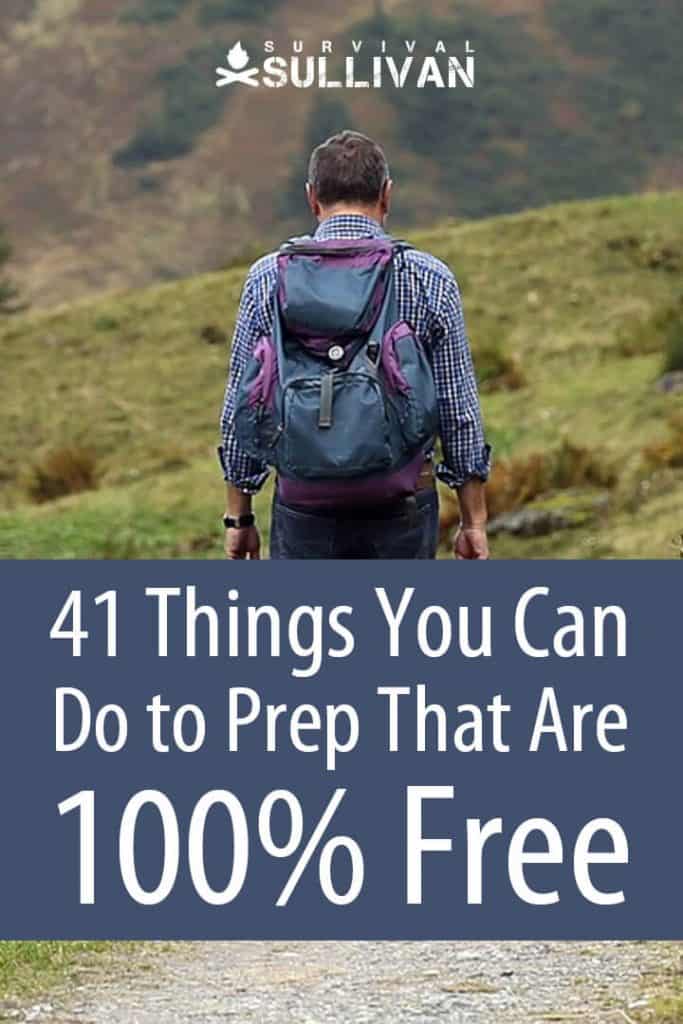

My dad was military. My grandfather was a cop. They served their country well. But I don’t like taking orders. I’m taking matters into my own hands so I’m not just preparing, I’m going to a friggin’ war to provide you the best of the best survival and preparedness content out there.

Unless you are planning to bug-out to rural Quebec, the rest of us Canadians speak English, just saying…
recipes to go with rice and beans
learn home canning
figure how much you need of supplies
decide on skills you need to learn ie how to wash clothes with no running water
#14. Designate and Prepare Your Safe Room
If you can’t prepare a safe room then break some and distibute your supplies up and hide them in different places so you don’t lose everything
#15. Label Your Preps
I only NUMBER my prep buckets, and I keep a list of the contents this way. No other information on the containers. So if someone broke in they’d have to take time examining each container which hopefully they won’t want to hang aroung long enough to really do
Also the containers at the front contain things such as nails and screws, various odd and ends but NO food, again to hopefully make them leave quickly.
#23. Ask Neighbors for Excess Produce
Barter weeding and help for produce at the outset
#29. Stockpile Water
If you have a pond or stream remember to buy water filters. More than ONE filter in case the one you have isn’t working properly. Remember the old saying “Two is one and one is none”